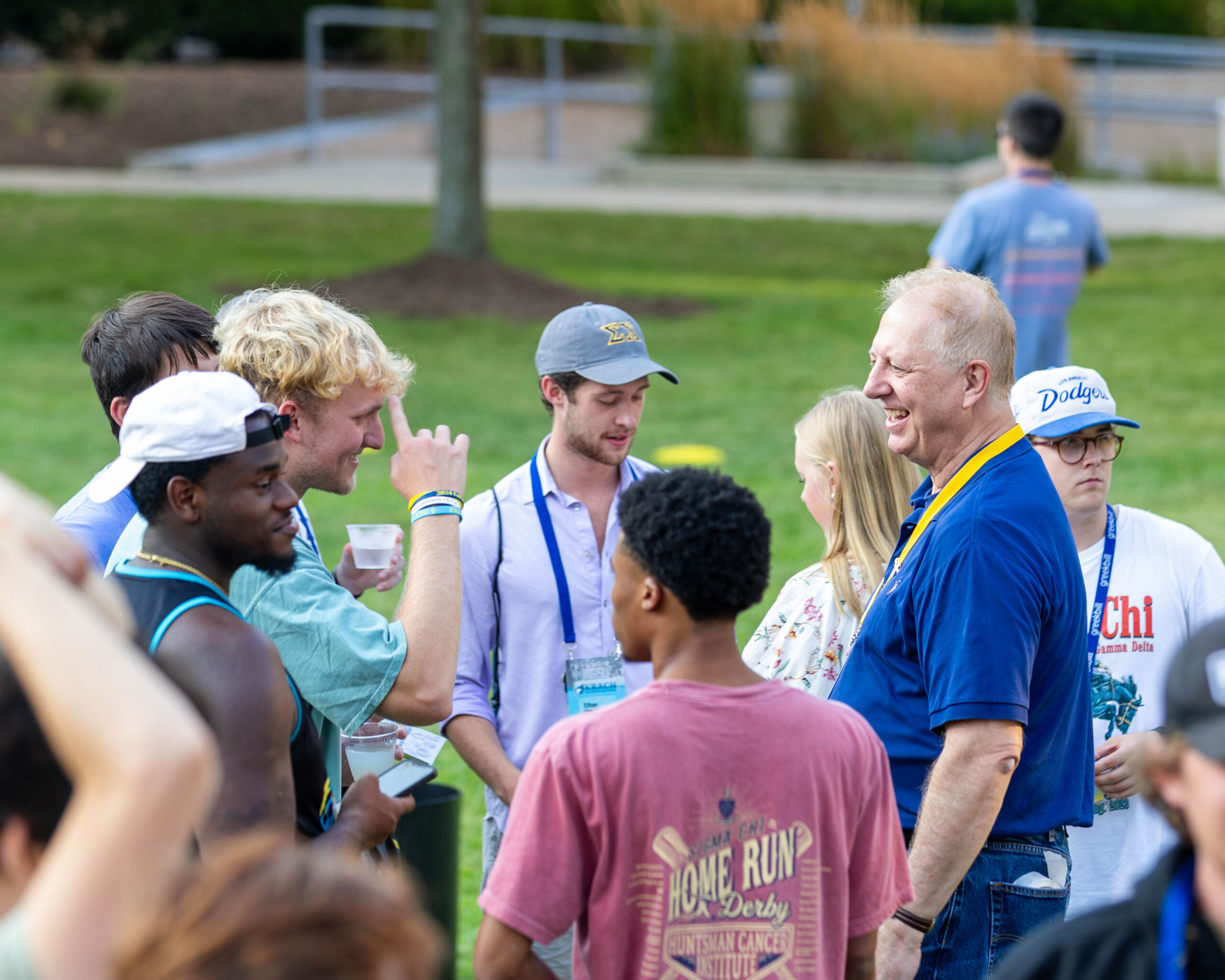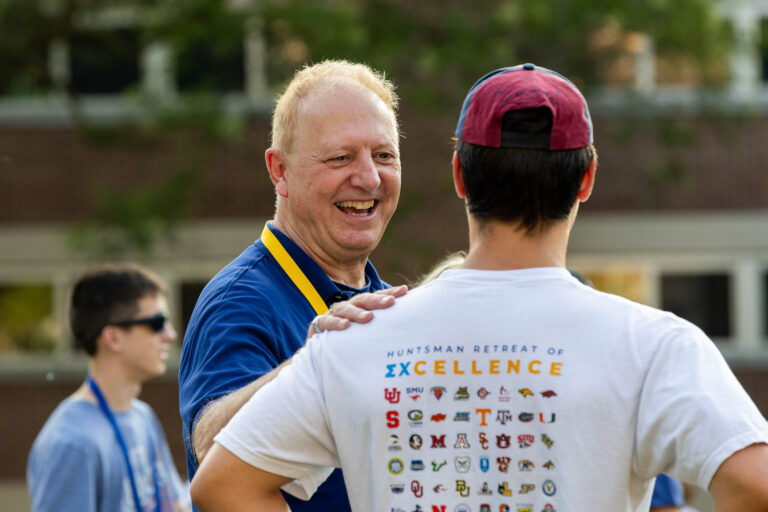Fraternity
- 1714 Hinman Ave. Evanston, IL 60201
- headquarters@sigmachi.org
- Directory


In a year, what has been the experience with expansion? What have you seen that you’ve liked?
Seven of the associate chapters we had in the pipeline got installed, and that includes two newbies. It’s really exciting, gratifying stuff. I had watched them as Grand Pro Consul go through the Expect More program for our associate chapters, and then to watch that culmination was really exciting. We still have eight in the pipeline. The point now becomes that list of where we go next.
Grand Pro Consul Ryan Temby, RUTGERS 1990, Director of Fraternity Growth Des Robinson, TARLETON STATE 2015, and the expansion team have got that targeted list and have honed it. One of the schools we talked about was Chapman University. We are headed to Orange County. They’re going to have boots on the ground in September. We continue to fine tune that list. I met with a group that is just starting, and we were in with the expansion team recently. The group just organized in spring, and they’re excited to start recruiting in the fall. It was really refreshing.
Which of the installations over the past year has been the most meaningful to you?
Each one has their own special place. The pure academic, intelligence and cognitive levels that Stanford brought — and they were the first — were amazing to me. Sacred Heart is surrounded by Bryant and New Haven. They’ve got such a strong community around them, and they are such a rockstar chapter.
A heartstring favorite was definitely UAB (University of Alabama-Birmingham). I had met one of their associate members when they were struggling with the Expect More program, and they were about to fold. They were going to say, “We aren’t going to do this,” and we were able to coach them, coax them and encourage them. That member came back the next year and said they made great progress and, sure enough, in the fall of 2023 they got that formal petition done. We installed them in February 2024.
When you talk about strength of alumni, you have to bring up the University of Southern Mississippi. Don’t get me wrong, the undergraduates on the chapter there, and the cohesion that they built, the real friendships and similarities they had in their stories, and their value systems and their belief systems, it was like they were already a chapter. But the alumni there that pumped that through were really good, and I was able to connect with a couple of alums on a different level.
We, of course, reinstalled Rutgers and, boy, that chapter is crushing it. They really are. I give Temby a lot of teasing about it, but they really have done well. The other one where the undergraduates stepped up is Pittsburgh. I don’t know that the local alumni did it so much as the Grand Praetor, David Conway, NEW MEXICO 2012, when he brought the area alumni together in Pittsburgh. That installation itself was really terrific. The young men that have formed that chapter — wow. They are definitely destined to stay with Sigma Chi.
What’s been the highest high you’ve felt this past year?
We took an alumni fundraising activity down to Louisville. When we did that, we tied in the prospect of going back to Miami (Ohio). I convinced Brother Mike Church, ILLINOIS 2005, executive director of Sigma Chi, to bring the original Daniel William Cooper, MIAMI (OHIO) 1857, badge. When we finished our alumni event, we took those same alumni, seven of us, to the Founding site and had a Ritual meeting in the founding room with the original badge. That was really exciting.
To top it off, the history of the badge is that a former Consul who was then a grad student from Tulsa was going to graduate school in Pittsburgh. When Founder Cooper died in Pittsburgh, he drove over and is the one that rescued the badge. He took (Cooper’s) badge off and saved the Cooper badge for us. It just so happens that a week after the Louisville trip was the Pittsburgh installation, so the Cooper badge went with me to Pittsburgh. It went from the Founding site to gravesite in a week. That was really exciting because we made a pilgrimage to the marker and to the cemetery.
How have the goals discussed last year shifted? What is the outlook going to be for this next year?
We’ve seen our intake numbers drop. For the target growth on a macro level of percentage points, there was actually negative growth this past year. We’ve long debated about the optimum size of a chapter for a Sigma Chi experience, and I don’t know that there is one. I know there are 120-man, 220-man chapters, and there are 20-man chapters that all provide that experience and all have that value-added experience, but the sweet spot of the Fraternity tends to be 45. Maybe that’s low. The average size of the Fraternity is 67, but that includes, what I call, the mega-chapters. The Etas and the Omega Omegas.
The real need that I see coming up is to support those chapters where there was some institutional knowledge lost when we graduated the pre-COVID-19 guys, and some of that has been recruitment. Some people are still in “Covid cocoons” to some degree, so we’ve got to get out there and provide the resources and teachings and the coaching and mentoring into how to get back out and make friends and how to grow the chapters and recruit.
What are your expectations of the undergraduates of Sigma Chi looking to the year ahead?
I want to see them recruit, learn about recruitment and practice it. I want to see them get back involved in their campuses. One of the things that has dropped off at Sigma Chi is our participation on campus. There was an expectation by many chapters that, not only are you a brother, but you also go join another organization and, if at all possible, you become an elected leader in that organization. I think that is still an expectation by many chapters, and it may not be a written expectation or anything, but we want to be involved to better our campuses. Plus, it’s a great way to recruit. There’s a lot of benefits all the way around. Our campus participation has dropped off significantly enough that it’s worrisome. I think we’ve got work to do in our own campus communities, and those communities will benefit from our participation. It’s not altruistic or self-centered. It’s an attempt to give back and be involved in more than just our brotherhood.
What would you challenge alumni to do in this upcoming year?
Our technology platform is going to make it so much easier to connect, to engage and get back into the Sigma Chi rhythm and cadence. They’re not ever out of our fold. I have not met a Sigma Chi that, even if they aren’t doing Sigma Chi, they’re not thinking Sigma Chi and living Sigma Chi. They’re always living our values. They’re raising their kids and are doing things that might not allow them the freedom or the luxury of coming to a workshop or even attending a chapter or alumni chapter meeting, but there’s always a Sigma Chi connection going on in their daily lives. This new technology platform we’ve got and the work that the Member Engagement Committee is doing is going to make it so much easier.
Just making it easier isn’t the answer. We’ve got to be able to entice them and deliver some reciprocals. What’s in it for them? Why are they getting back into this? We need to really deliver some ideas or some reason for them to get back involved, whether that’s a mentorship role, an advisory role or just a reconnection role. I love that we’re moving that forward with the idea that there’s so much to offer in life experience that our brothers and our alumni brothers have that they can share, and a lot of them want to share. They just don’t know where to start. How do I show up at a chapter that wasn’t my chapter that might only be 20 minutes away and say I want to be your mentor? We’ve got to be able to make those connections for them and, to some degree, we need their initiative and to make it seamless for them.
What would you say would be the first step for the alumni who want to be back involved?
The easiest step is to reach out to any alumni chapter in the area. If there’s not an alumni chapter, once our technology is up and we’ve got the access that you can verify you’re a Sigma Chi, all of a sudden you can get connected to the Grand Praetor or a chapter advisor. If you’re talking about connecting to a chapter, they need that introduction to you, and the chapter advisor or Grand Praetor is going to be the best way to do that.
From a personal standpoint, what do you want to see happen in the next 12 months?
I want to have a little more fun. I think we’ve really laid out a good foundation thanks to Past Grand Consul Tim Sanderson, WESTERN 1985, and our partnership with the Risk Management Foundation and the Sigma Chi Leadership Institute, and I’m ready to start building. I’m tired of saying the sand is flat and the cornerstone’s in. I’m ready to start moving. We’ve done a lot of prep and have put out some fires and reorganized some things. The technology’s innovated and has created change, but my role seems to be just doing the same thing, and I’d like to be able to see a catalyst of some sort that really sparks. Whether it’s alumni engagement, growth or campus involvement, it’s about time to pull the trigger. I think I’ve aimed enough. Let’s do something.
To that point, what would that one thing you want to do?
I’m still going to go back to growth. I’m still going to go back to the idea that I want our chapters to be able to recruit quality guys and substantial, chapter-changing numbers. I don’t want them to say we increased and took five or six guys. That’s great, thank you, but let’s have chapter-changing numbers.